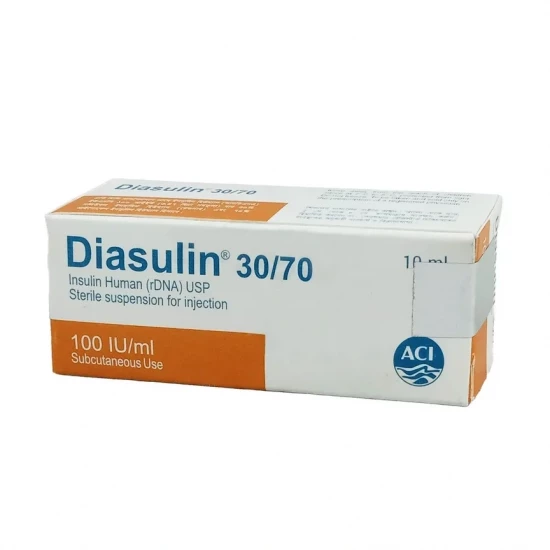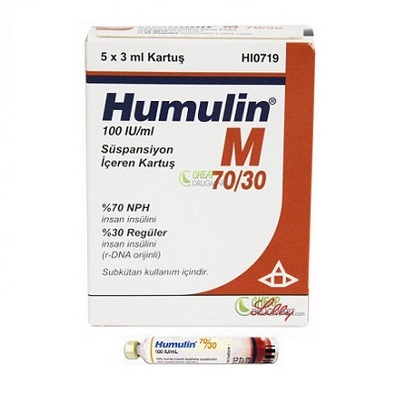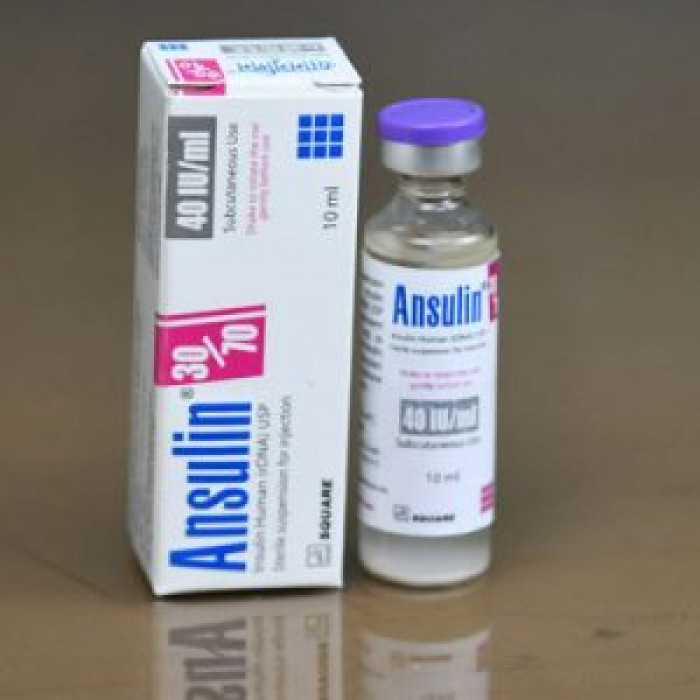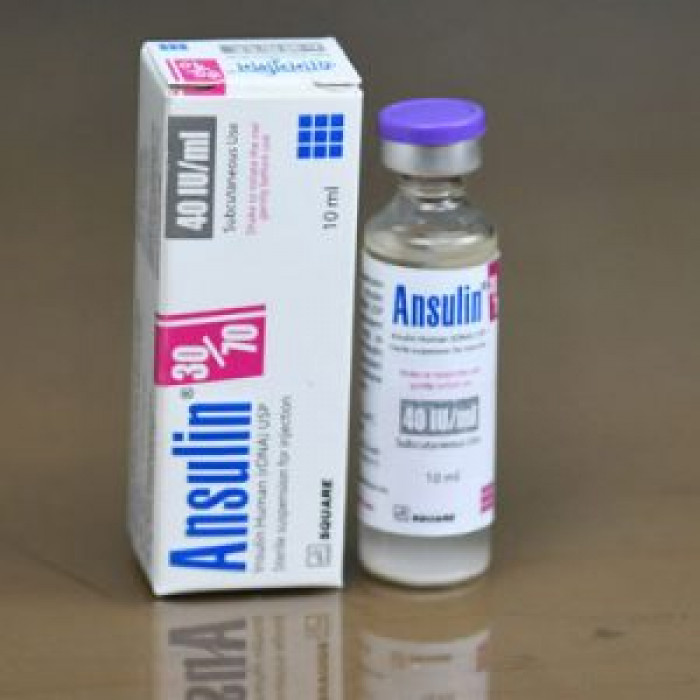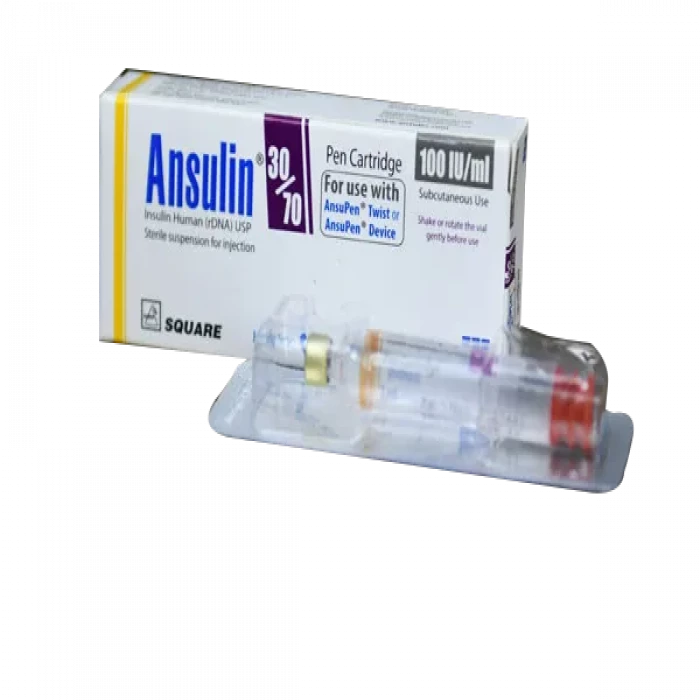
✔ 100% Authentic Product
👁️ Currently Viewing 4145
Ansulin 30/70 Pen Cartridge 100IU/ml
Ansulin 30/70 Pen Cartridge [Insulin (Human) Regular + Insulin (Human) Isophane (pre-mixed)] is a combination of two medicines, an intermediate-acting and a short-acting type of insulin. It is used in the treatment of diabetes mellitus (type 1 and 2) to improve blood sugar control both in adults and children. It helps maintain the blood sugar levels in diabetic patients.
🚚 তাপমাত্রা নিয়ন্ত্রিত ডেলিভারি: এই পণ্যটি গুণগত মান বজায় রাখতে শুধু মাত্র ঢাকা শহরের ভিতরে আইস ব্যাগ এর মাধ্যমে ডেলিভারি করা হয়।
Discount
Price: ৳ 211
MRP:
৳
222
5%
Off

100% Genuine Products, Guaranteed

Safe & Secure Payments, Always

Fast, Secure & Efficient Delivery

Proper Packaging
 Cash on Delivery - All over Bangladesh
Cash on Delivery - All over Bangladesh Regular Delivery - 12-24 Hours, Dhaka City* Charge Tk.39-59
Regular Delivery - 12-24 Hours, Dhaka City* Charge Tk.39-59 Regular Delivery - 24-48 Hours, Other Cities* Charge Tk.99-110
Regular Delivery - 24-48 Hours, Other Cities* Charge Tk.99-110
🌙 রমযান অফার 🌙
 ফ্রি ডেলিভারিঃ - ৭৯৯ টাকা+ অর্ডারে, ঢাকা
শহরে
ফ্রি ডেলিভারিঃ - ৭৯৯ টাকা+ অর্ডারে, ঢাকা
শহরে ফ্রি ডেলিভারিঃ - ২৭৯৯ টাকা+ অর্ডারে, ঢাকার
বাহিরে
ফ্রি ডেলিভারিঃ - ২৭৯৯ টাকা+ অর্ডারে, ঢাকার
বাহিরে
📲 মোবাইল অ্যাপ অর্ডারে সাশ্রয় বেশী
-
Google Play Store থেকে ডাউনলোড
-
Apple Store থেকে ডাউনলোড
100% Genuine Products, Guaranteed
Safe & Secure Payments, Always
Fast, Secure & Efficient Delivery
Proper Packaging
 Cash on Delivery - All over Bangladesh
Cash on Delivery - All over Bangladesh Regular Delivery - 12-24 Hours, Dhaka City* Charge Tk.39-59
Regular Delivery - 12-24 Hours, Dhaka City* Charge Tk.39-59 Regular Delivery - 24-48 Hours, Other Cities* Charge Tk.99-110
Regular Delivery - 24-48 Hours, Other Cities* Charge Tk.99-110 ফ্রি ডেলিভারিঃ - ৭৯৯ টাকা+ অর্ডারে, ঢাকা
শহরে
ফ্রি ডেলিভারিঃ - ৭৯৯ টাকা+ অর্ডারে, ঢাকা
শহরে ফ্রি ডেলিভারিঃ - ২৭৯৯ টাকা+ অর্ডারে, ঢাকার
বাহিরে
ফ্রি ডেলিভারিঃ - ২৭৯৯ টাকা+ অর্ডারে, ঢাকার
বাহিরে- Google Play Store থেকে ডাউনলোড
- Apple Store থেকে ডাউনলোড
🌙 রমযান অফার 🌙
📲 মোবাইল অ্যাপ অর্ডারে সাশ্রয় বেশী
✅ Description:
Ansulin 30/70 Pen Cartridge is prescribed for both type 1 and type 2 diabetes mellitus, a condition affecting glucose processing in the body. In Diabetes Mellitus Type 1, inadequate insulin is produced to manage blood sugar levels. In Diabetes Mellitus Type 2, either insulin production is insufficient or there's resistance to its effects. This medication combines Human insulin (short-acting) and Insulin isophane (intermediate-acting) to regulate liver sugar production and enhance sugar uptake in cells, ensuring consistent sugar control.
Follow your doctor's instructions for administering Ansulin 30/70 Pen Cartridge. Seek healthcare assistance if self-administration is challenging. Common side effects include injection site allergies, hypoglycemia, itching, skin changes at injection sites, swelling, rashes, and weight gain. While many side effects resolve naturally, persistent issues should be discussed with your doctor.
Prior to using Ansulin 30/70 Pen Cartridge, consult your doctor if you're pregnant, breastfeeding, or have concerns. The medication may induce drowsiness; exercise caution when driving. Avoid alcohol while using this medication to prevent adverse effects. Children should only take it under a doctor's prescription. Inform your doctor about your health status and medications to prevent interactions. Store the medication at 2-8°C in a refrigerator; avoid freezing it.
Safety Advices

Alcohol
UNSAFE
You are recommended not to consume alcohol along with Ansulin 30/70 Pen Cartridge to avoid unpleasant side effects. Alcohol may cause increased drowsiness.

Pregnancy
CONSULT YOUR DOCTOR
Ansulin 30/70 Pen Cartridge can be used during pregnancy if prescribed by a physician. It's important to consult your doctor before administering this medication if you are pregnant.

Breastfeeding
CONSULT YOUR DOCTOR
Ansulin 30/70 Pen Cartridge is considered safe for use during breastfeeding. However, it's advisable to consult your doctor before administering this medication if you are breastfeeding.

Driving
CAUTION
If your ability is affected by Ansulin 30/70 Pen Cartridge, avoid driving, operating heavy machinery, or engaging in tasks that require focus and attention.

Kidney
CAUTION
If you have kidney problems, exercise caution when using Ansulin 30/70 Pen Cartridge. It's important to consult your doctor before administration.

Liver
CAUTION
If you have liver problems, use Ansulin 30/70 Pen Cartridge with caution. Consult your doctor before administering this medication to ensure its appropriateness for your condition.
✔️ Uses of Ansulin 30/70 Pen Cartridge
- Treats diabetes mellitus (both type I and type II)
✔️ How does Ansulin 30/70 Pen Cartridge work?
Ansulin 30/70 Pen Cartridge is a combination of short-acting human insulin and intermediate-acting insulin isophane. It effectively treats both type 1 and type 2 diabetes mellitus by curbing liver sugar production and enhancing sugar uptake by fat and muscle cells, thus ensuring prompt and consistent blood sugar management. This medication aids in enhancing glycaemic control, mitigating the risk of diabetes complications like retinopathy, nephropathy, neuropathy, delayed wound healing, and diabetic foot ulcers.
✔️ Side Effects of Ansulin 30/70 Pen Cartridge
- Allergic reaction at the site of injection
- Hypoglycemia (low blood glucose level)
- Itching
- Lipodystrophy (skin thickening or pits at the injection site)
- Oedema (swelling)
- Rashes
- Weight gain
✔️ Quick Suggestions:
- Take it 15 minutes before a meal or within 20 minutes after starting a meal.
- Injection below the skin of the abdomen results in faster absorption than other injection sites such as skin of the upper arms, thighs, or buttocks. After injection, the site of injection should not be massaged.
- Injection sites must be rotated to prevent hard lumps from developing at one site.
- Change to another type or brand of insulin should be done under strict medical supervision as it may require a change in dosage.
- Hypoglycemia (low blood sugar level) may occur when taken along with other antidiabetic medicines, alcohol or on delaying/skipping a meal. Carry a sugar source with you for immediate relief.
- Do not share your insulin device with other people, even if the needle has been changed. You may give other people a serious infection or get a serious infection from them.
- Opened vials / cartridges stay good at room temperature for up to 4 weeks, while unopened vials must be placed in the refrigerator (2°C–8°C).
✔️ Indication of Ansulin 30/70 Pen Cartridge
Indicated for:
- Treatment of all type 1 diabetic patients.
- Treatment of type 2 diabetic patients who are not effectively managed with dietary measures and/or oral hypoglycemic agents.
- Initial stabilization of diabetes during periods of stress, such as severe infections and major surgery, in patients with diabetic nephropathy, hyperosmolar non-ketone syndrome, and diabetic patients.
- Treatment of gestational diabetes.
✔️ Pharmacology
Human insulin (rDNA) is a type of insulin that is manufactured using recombinant DNA technology. It closely resembles the structure and function of natural insulin. Insulin plays a crucial role in regulating glucose metabolism by promoting the breakdown and utilization of glucose in the liver, muscles, and adipose tissue. Additionally, it helps lower blood sugar levels by promoting glycogenesis (glucose storage) and inhibiting gluconeogenesis (glucose production).
Both Human insulin (rDNA) 30/70 and Human insulin (rDNA) 50/50 formulations have specific onset, peak, and duration of action profiles:
- Onset: These insulins start working approximately 30 minutes after injection.
- Peak: They reach their peak effectiveness around 2 to 8 hours after injection.
- Duration: The effects of these insulins last for about 18 to 24 hours.
✔️ Dosage & Administration of Ansulin 30/70 Pen Cartridge
The typical daily insulin requirements for maintenance therapy in type 1 diabetes patients range from 0.5 to 1.0 IU/kg of body weight. In pre-pubertal children, this range is usually 0.7 to 1.0 IU/kg, while insulin-resistant cases like during puberty or due to obesity might require higher daily doses. Initial dosages for type 2 diabetes patients are generally lower, around 0.3 to 0.6 IU/kg/day.
The insulin dosage, administration time, and form can vary due to individual patient differences. Factors such as food intake, work routine, and exercise intensity can also affect the required dosage. Therefore, patients should use insulin under the guidance of their healthcare provider.
After injecting, a meal or snack with carbohydrates should be consumed within 30 minutes. Injections are given subcutaneously in areas like the upper arm, thigh, buttock, or abdominal wall. Absorption is faster when injected into the abdominal wall. Insulin Human (rDNA) 30/70 & Insulin Human (rDNA) 50/50 should never be administered intravenously.
✔️ Preparation before use:
- Wash your hands.
- Gently shake or rotate the vial to uniformly mix the solution. Check for normal appearance.
- If using a new vial, remove the plastic cap, and wipe the rubber plug with an alcohol swab.
- Draw air into the syringe equal to the needed insulin amount.
- Insert the needle into the vial and inject the air.
- Turn the vial and syringe upside down, and withdraw the correct insulin dose into the syringe.
- Before removing the needle, check for any remaining air bubbles. If present, tap the syringe to remove them.
✔️ Injection site:
- Choose an area with less tight skin like the upper arm, thigh, buttock, or abdomen.
- Keep each injection site at least 1 cm away from the previous one to avoid tissue damage.
✔️ Injection method:
- Cleanse the skin with alcohol at the injection site.
- Position the needle at a 45° angle to the skin.
- Insert the needle into the skin and inject the insulin.
- Keep the needle under the skin for at least 6 seconds to ensure the entire dose is delivered.
- Withdraw the needle and apply gentle pressure to the site.
- Do not rub the injection site.
✔️ Interaction
When using oral contraceptives, adrenocorticotropic hormone, thyroid hormone, and other medications that can elevate blood sugar levels, it might be necessary to increase your insulin dosage. On the other hand, when using medications with hypoglycemic effects such as salicylates, sulfanilamides, and certain antidepressants that can lower blood sugar, the insulin dose should be reduced. Adjustments in insulin intake should be made under the guidance of a healthcare professional to ensure proper management of blood sugar levels.
✔️ Contraindications
Hypoglycemia or the patients who have allergic reactions to insulin or any of the excipients.
✔️ Pregnancy & Lactation
Insulin does not cross the placental barrier, which means that there are no limitations on using insulin for diabetes treatment during pregnancy. Similarly, insulin treatment for nursing mothers does not pose any risks to the baby. This implies that insulin therapy can be safely utilized during pregnancy and while breastfeeding without concerns about its effects on the fetus or infant. However, it's always important for pregnant and breastfeeding women to consult their healthcare provider before making any changes to their medication regimen.
✔️ Precautions & Warnings
Inadequate medication or discontinuing treatment, particularly in the case of type 1 diabetes, can result in high blood sugar levels (hyperglycemia). On the other hand, excessive insulin dosing for insulin requirements, skipping meals, engaging in intense exercise without proper planning, or unforeseen events can lead to low blood sugar levels (hypoglycemia). It's important for individuals with diabetes to carefully manage their insulin dosages, monitor their blood sugar levels regularly, follow their prescribed meal plans, and coordinate their medication with their healthcare provider to prevent both hyperglycemia and hypoglycemia.
✔️ Storage Conditions
- Store it between 2°C to 8°C in the refrigerator.
- Do not freeze it.
- Keep it away from children and pets.
- Avoid opening the carton of cartridges to protect it from light.
⚠️Disclaimer:
At ePharma, we’re committed to providing accurate and accessible health information. However, all content is intended for informational purposes only and should not replace medical advice from a qualified physician. Please consult your healthcare provider for personalized guidance. We aim to support, not substitute, the doctor-patient relationship.




